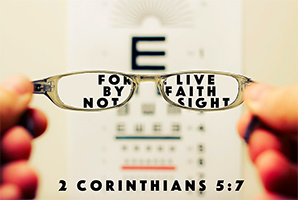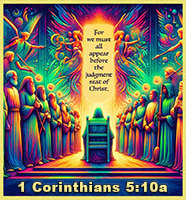Second Corinthians 5:1–10 . . .
Yearning for the Next Life
One of the great questions, which all of us has to face even though it may be in the privacy of our own thoughts, is: What’s waiting for me when I die? There’s new interest in that subject these days when one focuses on today’s encouraging ten-verse passage.
In the first five verses of chapter 5, we find discussion about the nature of our hope. And we learn a little more detail about last week’s “eternal glory” (2 Cor. 4:17). Apostle Paul describes it this way (Click to read 5:1–4 now)… What marvelous words! Obviously, that description of the present body of flesh and bones that we live in is contrasted with the same body, risen and glorified by the power of the Spirit of God. Paul says that this new body, the resurrected body, is an experience of not being disembodied but being further embodied. He changes last week's idiom — “the building” — to “the body,” saying that it’s like being fully clothed, more than we are presently.
Verse 5 is very reassuring, for Paul begins by saying in v. 5a, “Now the one who has fashioned us for this very purpose is God.” No one wants to float around in bodiless existence; the human spirit rejects and resists that idea. Paul says that your actual experience will be this: As believers, you’ll be fully clothed with a heavenly dwelling; you’ll have a new body. That’s a weight of glory beyond all description that will come instantly, for the one who has prepared us for this divine eventuality is God. We learn in v. 5b that we’ve already tasted this in our spirit, although not yet in the body, because the body is locked into time; it’s unredeemed and unresurrected. But in the spirit, in the inner life, we’ve already tasted the conditions. That’s why Paul says: “[God] has given us the Spirit as a deposit, guaranteeing what is to come.” Amen. That’s the taste of glory!
Isn’t that a great hope? When we go through struggles, we must remember always that every struggle, though it’s part of God’s plan for us, is part of an immense privilege that we have, sharing his sufferings, that we may also reign with him forever (2 Timothy 2:12; Revelation 22:5). What a hope, indeed!
The next five verses help answer the question: What is there to live for? Hopefully, many of you reading and appreciating vv. 6–10 will be helped by Paul’s answer. The world of the 1st century looked very bleak; there was no more reason for hope in the apostles’ days than in our own times. When you read the New Testament, you hardly ever find people in despair; instead, there’s often a cry of triumph and a feeling of hope running through its pages, although their circumstances didn’t look any more hopeful than ours.
Notice how Paul puts it as he introduces this passage to us. Verses 6 and 8 declare, “We are [always] confident.” He’s already encouraged us in 4:16 by writing, “Therefore we do not lose heart.” Such proclamations are repeated throughout today’s passage.
There are two reasons for such confidence (vv. 6–8). The first reason is that we’re in touch with the Lord by faith, not by sight. We don’t see him; he doesn’t come and sit down beside us and talk to us and put his arm around our shoulders and encourage us; but, nevertheless, he is and will remain present with us. That’s the first great reason for our renewed vigor and courage as we await our next life.
Paul sees another reason for our hope, encouragement, faith, and confidence. He says, “We . . . would prefer to be away from the body and at home with the Lord” (v. 8). He’s looking toward the future while summing up what we saw in the first five verses of this chapter: the great weight of glory that awaits us, and for which our present circumstances and trials are preparing us. Paul’s looking ahead. We too should look forward to being at home with the Lord, in his very presence, seeing him no longer only through the Spirit’s inner power, but face to face.
That’s the first result. In the next two verses, the apostle sees another outcome of our faith. He puts it very clearly in v. 9: “So we make it our goal to please him, whether we are at home in the body or away from it.” That’s an eternal principle; it’s not something that’s going to change when we leave this earth. We’re on earth to please God, to be a delight to him. That’s the sole purpose for living, and that’s what Paul’s saying here.
In connection with pleasing God, Paul introduces to his readers the matter of the “judgment seat of Christ,” which is oftentimes a very frightening and misunderstood concept to many people. But this isn’t a judgment to settle destiny! It’s a personal evaluation made by the Lord, given to each individual, of what his life has really been like. It’s as though you and the Lord walked together back through all the scenes of your life as he pointed out to you the real nature of what you did and didn’t do and say. So, it’s actually a time of disclosure; but it’s also a time of evaluation when we learn for the first time who was right and what attitudes we should or shouldn’t have had. The judgment seat is a helpful time of seeing the truth about ourselves.
That’s what Paul means when he speaks of: “running the race” (1 Cor. 9:24) and “pressing on toward the mark for the prize” (Philippians 3:14). Then, if a man succeeds, “he will receive a reward” or “he will suffer loss” (1 Cor. 3:14–15). That’s what the judgment seat of Christ determines. That said, remain faithful and confident; don’t hesitate to continue yearning for the next life.
Note: 2nd Corinthians encourages believers to embrace and follow the way of Jesus that transforms lives and values generosity, humility, and weakness. In chapters 1–3, Paul presents these four elements:
Treasure in fragile clay jars (ch. 4) | Old tent, new bodies (ch. 5)
God’s timely grace (ch. 6) | Godly sorrow, joyful reconciliation (ch. 7)
› Watch BibleProject’s superb animated video (2 minutes) that highlights Paul’s messages in these four chapters.
There are two key themes in today’s passage.
1) The promise of a heavenly dwelling: Paul contrasts our earthly bodies, described as temporary “tents,” with the eternal “building from God” that awaits believers in heaven. This theme emphasizes the hope of a glorious resurrection body, which is far superior to our current mortal bodies.
2) Living by faith and pleasing God: In addition, Paul encourages believers to walk by faith, not by sight, and to make it their aim to please the Lord in all circumstances. This theme underscores the importance of maintaining an eternal perspective and living with the awareness that we’ll all appear before Christ’s judgment seat.
Both themes reflect Paul’s focus on future glory and how it should shape Christian living in the present. He uses these concepts to provide encouragement and motivation for believers facing trials and suffering, urging them to look beyond their current circumstances to the eternal realities that await them.
† Summary of 2 Corinthians 5:1–10
Here’s my summary of this opening eighteen-verse passage of chapter four:
• Heavenly Dwelling and Eternal Perspective (v. 1)
Initially, Paul contrasts our earthly bodies, described as temporary “tents,” with the eternal “building from God” that awaits believers in heaven. This heavenly dwelling will be superior to our current mortal bodies; it represents the hope of a glorious resurrection body.
• Groaning for Glory (vv. 2–4)
Paul describes how believers “groan” in their current bodies, longing for their heavenly dwelling. This groaning reflects the challenges and sufferings of life in this world, but also activates an anticipation of something far better to come.
• The Spirit as a Guarantee (v. 5)
God has given believers the Holy Spirit as a guarantee or down payment of their future glorification. This assurance helps sustains our faith and hope in the face of present difficulties.
• Living by Faith (vv. 6–7)
In his next two verses, Paul encourages believers to walk by faith, not by sight. This means trusting in God’s promises even when we can’t see them fulfilled yet. Paul then expresses a desire to be “away from the body and at home with the Lord,” highlighting the tension between our physical existence and spiritual reality.
• Pleasing God (vv. 8–10)
Believers are urged to make it their aim to please the Lord in all circumstances, whether in the body or away from it. This focus on pleasing God stems from the understanding that we’ll all appear before Christ’s judgment seat, where our deeds will be evaluated.
This passage ultimately encourages believers to maintain an eternal perspective based upon living with and realizing the awareness of our future hope while striving to please God while we continuously face our present circumstances.
- Q. 1 How does Paul’s confidence in his future relate to 2 Cor. 4:16—18? To John 14:1–3?
- Q. 2 What role does your faith play in your future confidence?
- Q. 3 Is Paul motivated more by his desire to be with Christ, or by fear of God's judgment of him? Which motivates you?
2 Corinthians 5:1–10
New International Version (NIV)
[You can view it in a different version by clicking here; you can also listen to chapter 5.]
Awaiting the New Body
5 For we know that if the earthly tent we live in is destroyed, we have a building from God, an eternal house in heaven, not built by human hands. 2Meanwhile we groan, longing to be clothed instead with our heavenly dwelling, 3because when we are clothed, we will not be found naked. 4For while we are in this tent, we groan and are burdened, because we do not wish to be unclothed but to be clothed instead with our heavenly dwelling, so that what is mortal may be swallowed up by life. 5Now the one who has fashioned us for this very purpose is God, who has given us the Spirit as a deposit, guaranteeing what is to come.
6Therefore we are always confident and know that as long as we are at home in the body we are away from the Lord. 7For we live by faith, not by sight. 8We are confident, I say, and would prefer to be away from the body and at home with the Lord. 9So we make it our goal to please him, whether we are at home in the body or away from it. 10For we must all appear before the judgment seat of Christ, so that each of us may receive what is due us for the things done while in the body, whether good or bad.



